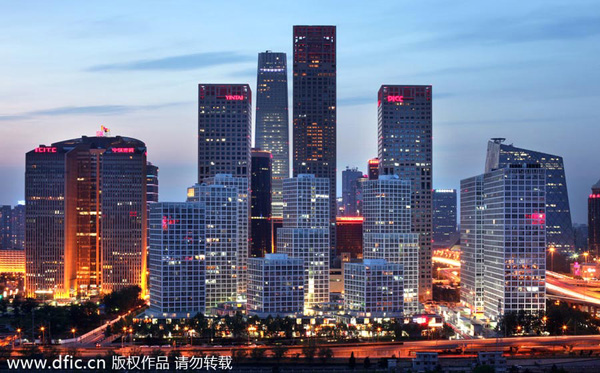 |
|
Night view of skyscrapers and high-rise buildings of Jianwai Soho and Yintai Center in CBD in Beijing, China. [Photo/IC] |
BEIJING - As banks and economic think tanks anticipate the publishing of China's full-year 2014 economic data in late January, many are predicting slow but higher quality growth for the world's second largest economy in 2015.
The most recent report by Standard Chartered forecast China's GDP to further decelerate to 7.1 percent in 2015 from an expected 7.3 percent in 2014.
A more moderate growth rate with stable growth engines is being hailed as the "new normal" for China's economy.
In the third quarter of 2014, growth slid to a low of 7.3 percent, a rate not seen since the 2008/2009 global financial crisis, dragged down by a housing slowdown, softening domestic demand and unsteady exports.
The bank based its forecast on the trend already shown in 2014, with growth in electricity, cement and steel-product production - all considered reliable indicators of industrial production and fixed asset investment - falling by an average 8 percentage points.
Standard Chartered forecast was in line with the outlook provided by China's central bank, the People's Bank of China, which predicted the country's GDP growth would "slow modestly" in 2015 to 7.1 percent.
In its working paper released in December, the central bank estimated the country's GDP growth for 2014 at 7.4 percent.
According to the research group led by Ma Jun, chief economist of the PBOC's research bureau, fixed asset investment growth will soften to 12.8 percent in 2015, down from an estimated expansion of 15.5 percent in 2014, dragged by slower investment into the real estate sector.
The property sector has been an important driver of growth China for most of the past decade, as housing prices soared and construction of new apartments mushroomed across the country.
After climbing at double-digit rates through most of 2013, housing prices in China started to cool in late 2013. The downturn continued in 2014 and spread to most major cities. Property investment, which affects more than 40 other industries, also cooled.
The 7.1 percent forecast was more or less in line with that provided by a government think tank, the Chinese Academy of Social Sciences, which expects China's economy growth to decelerate to 7 percent in 2015.
CASS attributed its moderate forecast to the country's external demand which is unlikely to rebound remarkably, its investment which is unlikely to keep growing rapidly due to overcapacity, weak innovation capabilities and high inventory in the property market, and a stabilizing consumption.
